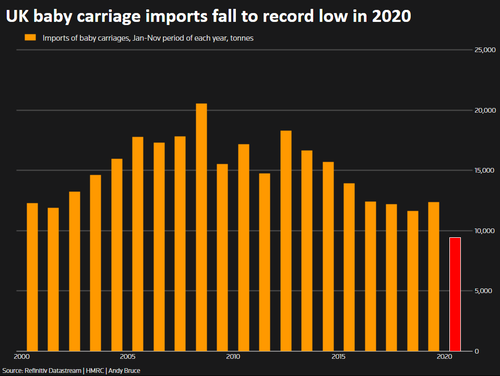By Tyler Durden
While people around the world have been trying to figure out what to do for fun during COVID-19 lockdowns, having unprotected sex apparently isn’t one of them. According to new figures out of Italy, bambino production is down by a staggering 21.6% across 15 Italian cities, according to Reuters, citing data from statistics agency ISTAT.
What’s more, the impact from lockdowns is just getting started – with marriages falling by over 50% in the first 10 months of 2020, pointing to “a probable decline in births in the immediate future” according to ISTAT chief Gian Carlo Blangiardo.
Demographics experts have been predicting a baby bust across Europe for 2021, as the impact of last year’s lockdowns is felt.
A survey conducted in five European countries during the March and April lockdown showed many people calling off plans to have kids. Germans and French were more likely to say they were delaying, while Italians were more likely to say they had abandoned their plans altogether.
Last year, Britain recorded a plunge in imports of baby carriages, to the lowest level since records began in 2000. (Yes, the Treasury counts imports of baby carriages. In tonnes.) –Reuters
And as Forbes reported on Wednesday, Italy isn’t alone – as new research from Brookings points to a pandemic baby bust rather than a baby boom.
In June 2020, the Brookings Institute estimated that the U.S. would see between 300,000 to 500,000 fewer births than in 2019. This came just a few months after restrictions had been implemented across the States. After taking into consideration school and daycare closures and the pressures of working from home, researchers said that they think their estimation of 300,000 fewer births is accurate.
A reduction in births was exactly the opposite of what many people anticipated would come out of 2020. Spending more time at home with a partner sounds like the perfect recipe for speeding up family planning. However, with increased job insecurity, health anxiety and the government encouraging people to stay away from hospitals, it’d seem Covid-19 made people reconsider. -Forbes
According University of Maryland sociologist and demographer Philip Cohen, not only did the birth rate drop recently, but fewer people have been searching for pregnancy and sex-related topics online.
“The bigger the economic fears, the bigger the impact on the birth rate,” said Martin Bujard, deputy director at Germany’s Federal Institute for Population Research. “So in countries where the welfare state minimizes the economic impact – like Germany – there might be less of a negative effect.”
According to the Guttmacher Institute, 34% of American women have reduced the number of children they expect to have, or have otherwise delayed their childbearing plans due to the pandemic. Similar patterns were observed in France, Germany, Spain and the UK, according to researchers Francesca Luppi, Bruno Arpino, and Alessandro Rosina.
“The economic fallout, persistent health concerns, uncertainty about the safety and availability of medical care and the closure of schools all combine to make this a very unappealing time for couples to start or expand their family,” said Emily Smith-Greenway, associate professor of sociology at the University of Southern California, in a statement to HuffPost. “We certainly anticipate there to be a rebound, but we’re not so sure about an overshoot ― a boom that helps to offset the bust.”






